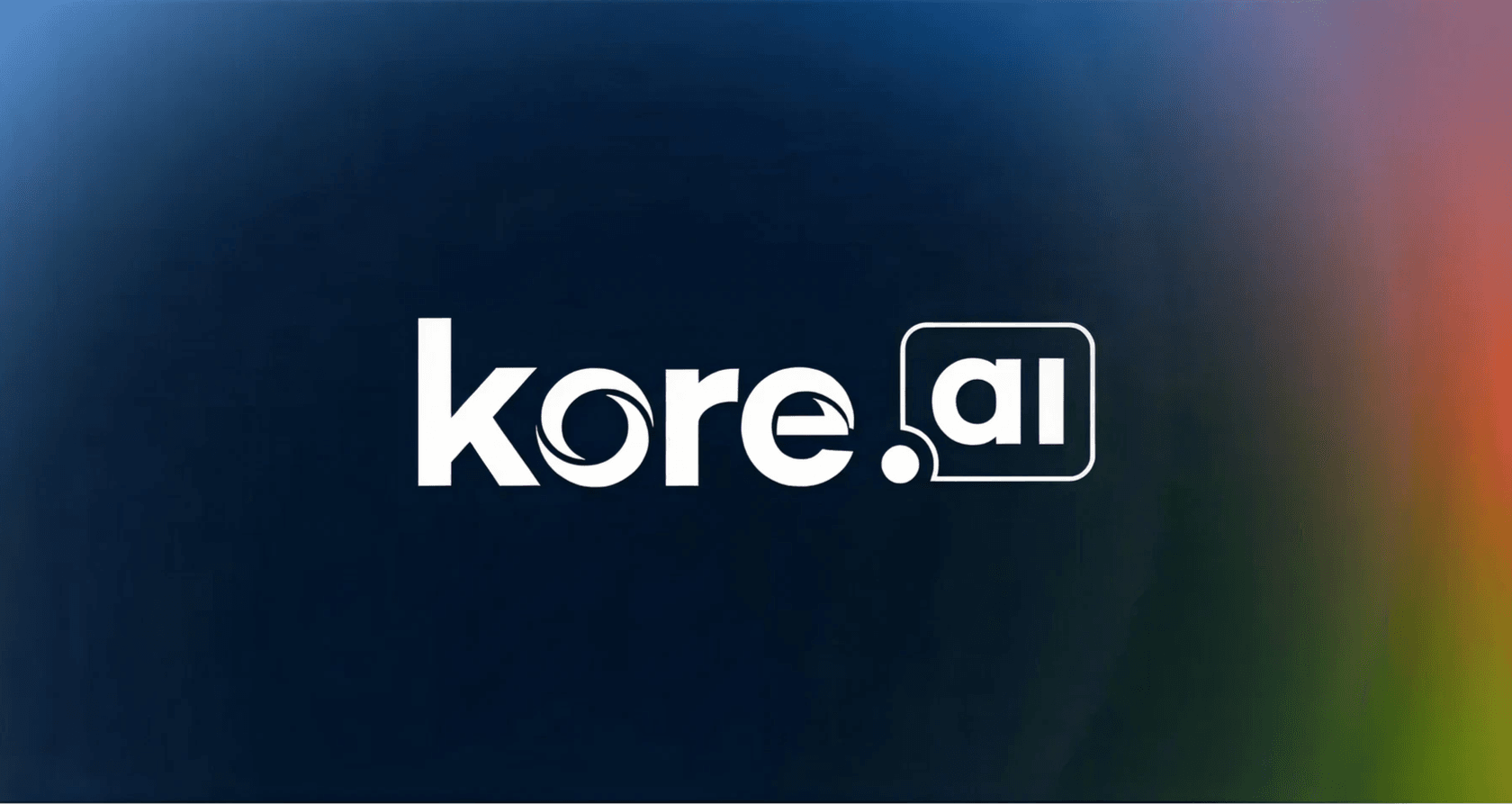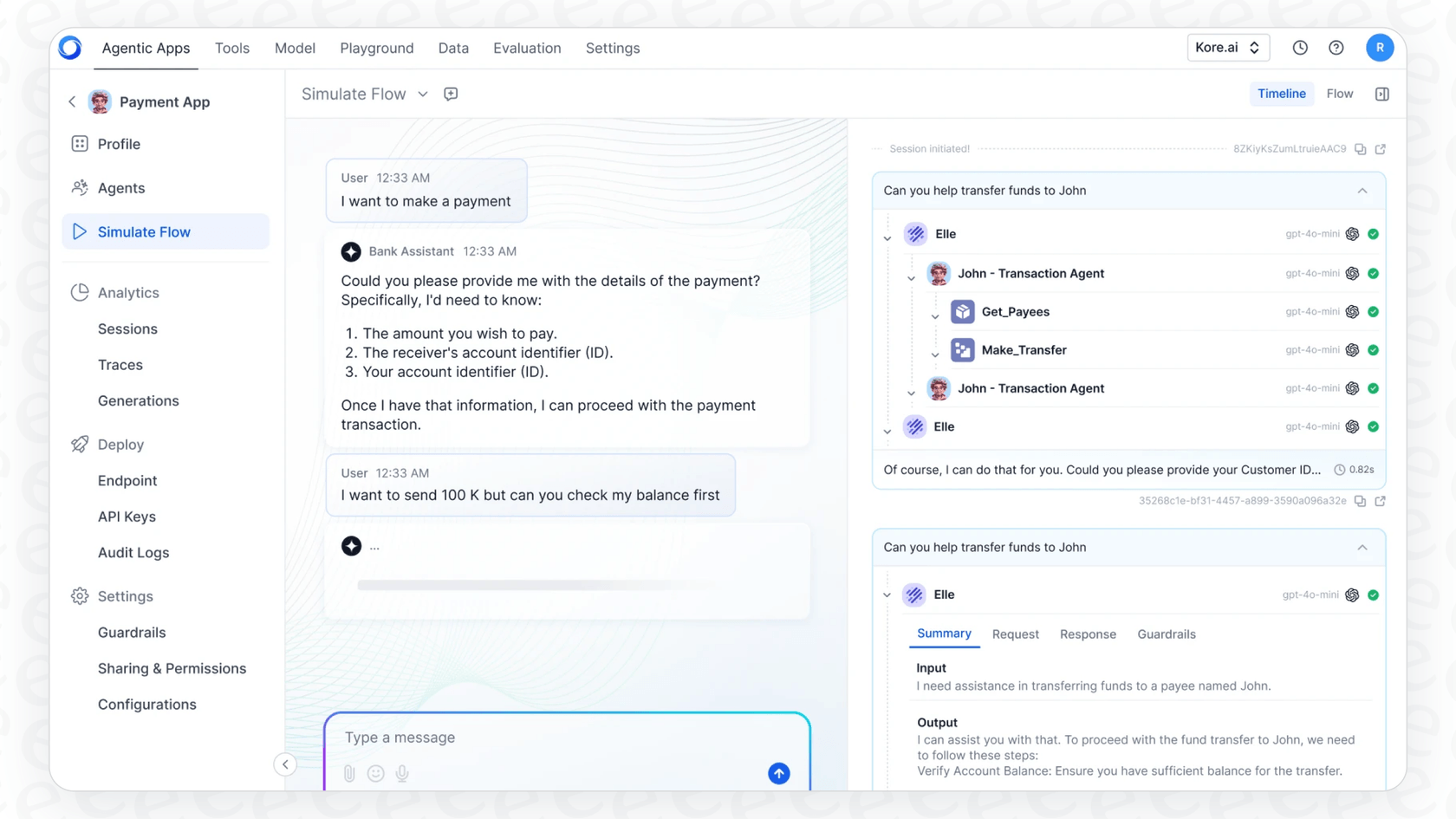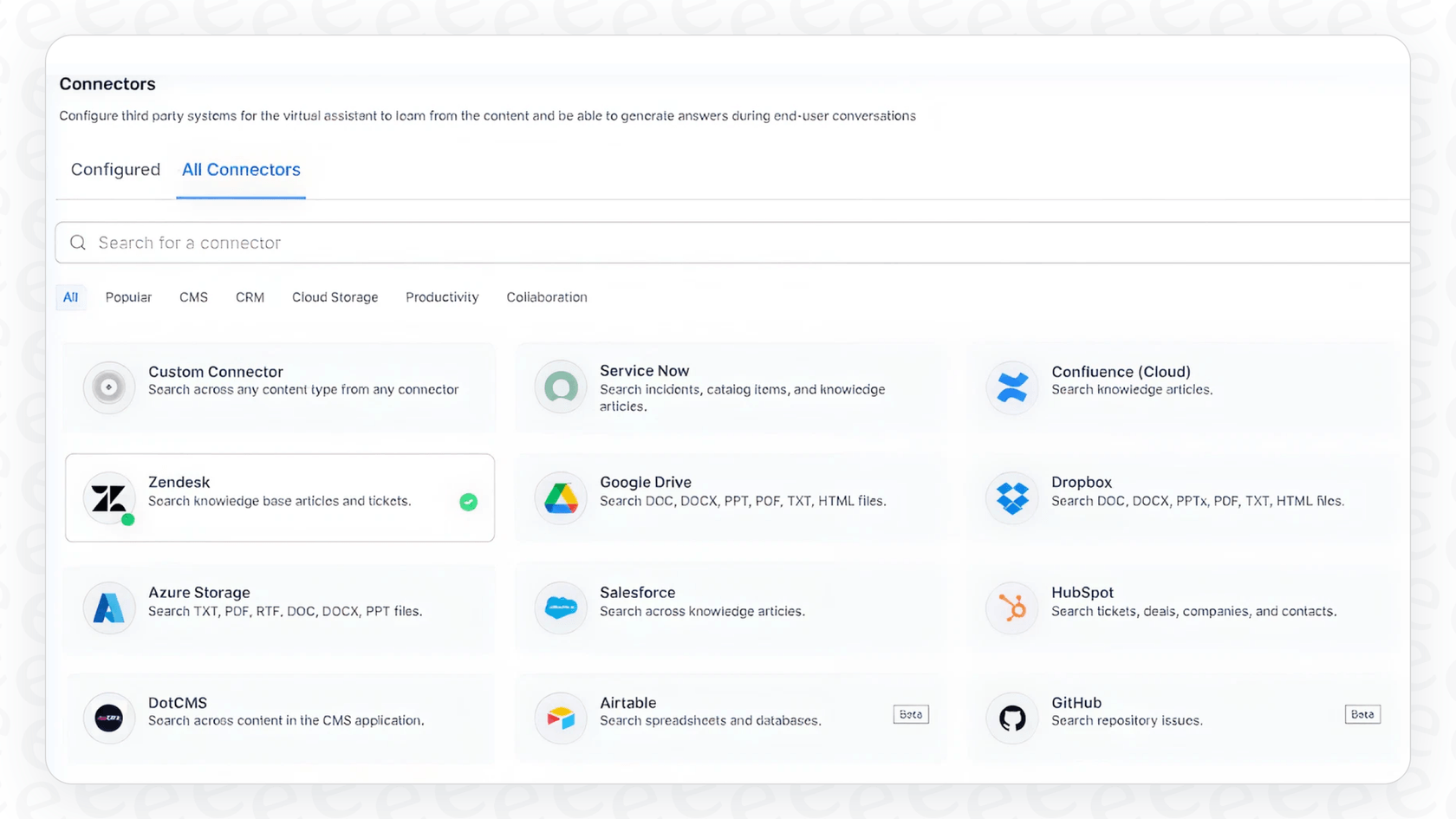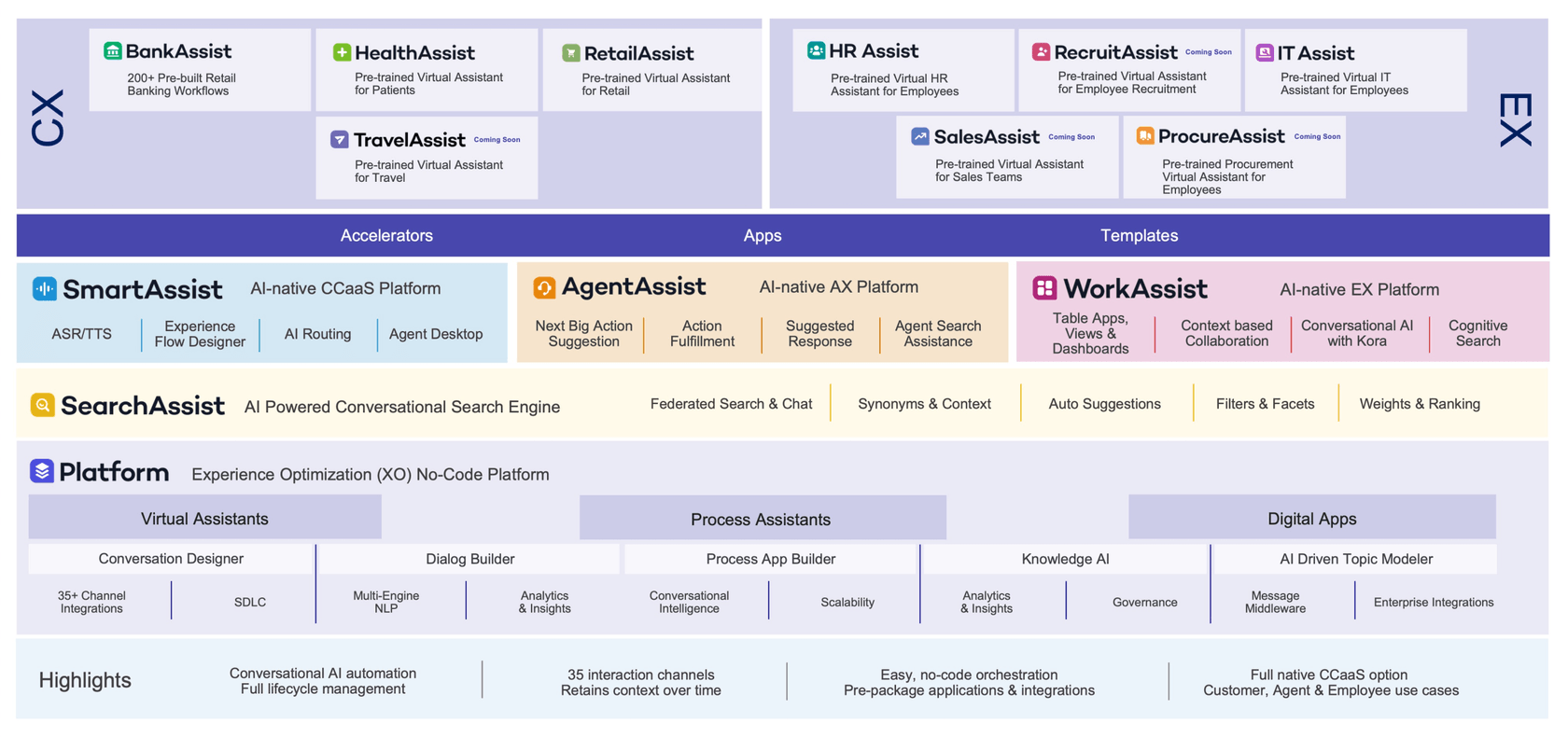
If you're exploring conversational AI for a large company, you've almost certainly come across the name Kore.ai. They’re a big deal in the space, often getting shout-outs from analysts like Gartner and Forrester for their heavy-duty solutions.
But what does that actually mean for you and your team? This post cuts through the noise. We'll give you a straightforward look at the Kore.ai platform, what it does well, who it's built for, and where it falls short.
We'll also talk about a different, more nimble approach for teams that can't afford to wait months for a return on their investment.
What is Kore.ai?
Kore.ai is a platform for big companies to build and manage their own complex AI agents. The main idea is to automate tricky interactions, whether that’s with customers or your own employees. They split their tools into three buckets: customer service, employee productivity, and general workflow automation.
Just look at their customer list, Morgan Stanley, Pfizer, AT&T, and you get the picture. They’re targeting global corporations with deep pockets. With over $223 million in funding, including a recent $150 million round with NVIDIA, they have the resources to build a powerful, but also very complex, system.
A breakdown of the platform and its features
The Kore.ai platform is designed for huge, company-wide rollouts. While that comes with a lot of power, it also brings a level of complexity you need to be aware of before you sign on the dotted line.
Multi-agent orchestration and agentic workflows
One of Kore.ai's big selling points is the ability to build and manage a whole team of AI agents that work together. For example, one agent could greet a customer, and another could go dig up order details from a different system.

That sounds pretty advanced, and it is. But getting it to work means you need serious technical skill on your team, developer time, and a willingness to completely rethink your current processes. It's definitely not a plug-and-play kind of deal.
For most teams, a single, smart AI agent is a much more realistic goal. A tool like eesel AI focuses on giving a non-technical manager full control over one powerful AI agent. You can decide exactly what it handles and when it passes a ticket to a human, without the headache of managing a fleet of bots.

No-code and pro-code tools
The platform has a "no-code" visual builder for designing conversations, plus "pro-code" tools for developers who want to get their hands dirty.

But let's be honest, in the enterprise world, "no-code" rarely means no tech help. You’ll likely still need someone technical to handle integrations and logic. And the "pro-code" option? That’s a guaranteed project for your developer team, which can slow things down when your support team just wants to make a quick change.
This is a big difference from a truly self-serve platform like eesel AI, which is built for the person actually using it. A support lead can connect data sources, tweak the AI’s personality, and get an agent live in minutes, all without bugging a developer.

Enterprise integrations and data sources
Kore.ai talks a lot about its 100+ connectors for systems like Salesforce, SAP, and SharePoint. These are built for deep, custom integrations.

The reality is that setting these up is often a massive project that can take months. It’s not designed for a team that wants to add AI to their helpdesk and see results this week.
eesel AI goes for a different strategy, focusing on easy, one-click integrations with the tools you're already using, like Zendesk, Freshdesk, Confluence, and Slack. It fits into your current setup instead of making you rebuild it.

| Feature | Kore.ai | eesel AI |
|---|---|---|
| Main Goal | Deep, custom integrations with systems like SAP, Oracle | Quick, one-click connections to your helpdesk & docs |
| Setup Time | Weeks or months, needs a dev team | Minutes, you can do it yourself |
| How it Fits In | Often means changing your existing processes | Plugs right into your current workflow |
| Who It's For | Huge companies with dedicated AI teams and budgets | Support and IT teams of any size who need to move fast |
Use cases and industry solutions
Kore.ai has several pre-built solutions for specific industries, like BankAssist, HealthAssist, and IT Assist. The idea is to give you a head start with a model that already knows some industry jargon.

The catch? These templates can be pretty rigid. If your company’s way of doing things doesn't quite match their template, you're looking at a complicated and expensive customization project, which kind of defeats the point.
A more flexible way to go is to use an AI that learns from your company's actual data from the get-go. Instead of a generic template, eesel AI gets smart by reading your past support tickets, internal wikis, and help articles. This way, it builds a hyper-personalized AI that gets your products, your brand's voice, and the real problems your customers have.

Kore.ai pricing
You won’t find a pricing page on the Kore.ai website. To get a number, you have to contact their sales team and go through the whole demo and discovery process.
This is pretty common for enterprise software that costs six or seven figures a year. It usually means a long sales process, custom contracts, and no way to try it out on your own or start small with a monthly plan.
That opaque process can be a real blocker for a lot of teams. On the flip side, eesel AI has a totally transparent pricing page. You can see the plans, sign up yourself, and know what you're going to pay. And importantly, there are no weird per-resolution fees, so you won't get a surprise bill if you have a busy month.

The alternative for agile teams
So, let's sum it up. Kore.ai is a seriously powerful platform built for the biggest companies in the world, the ones with big AI engineering teams, big budgets, and the patience for a long implementation project.
But what if that doesn't sound like you? What if you need to show results this quarter, not next year? For most support, IT, and ops teams, there's a much faster and simpler way to get started with AI automation.
The alternative is a tool built for speed and simplicity, without skimping on power. eesel AI is designed with a few core ideas that are the opposite of the old-school enterprise model:
-
Go live in minutes, not months: The platform is genuinely self-serve with one-click integrations, so you can build and launch your first AI agent in less than five minutes.
-
Keep control without the complexity: A simple prompt editor lets you define your AI's tone and behavior. You decide exactly which tickets get automated.
-
Connect your knowledge instantly: Your best information is in your past conversations and existing documents. Train your AI on that so it's actually helpful from day one.
-
Test with real data: A simulation mode lets you see how the AI would have handled thousands of your past tickets. You can see the potential resolution rate and cost savings before you ever turn it on for customers.

Is Kore.ai the right AI platform for your team?
Look, Kore.ai is a leader in the enterprise AI world for a reason. It’s a deep, powerful tool for companies that have the time, money, and technical staff to take on a massive project.
But for most teams out there, getting real value from AI doesn't have to be that hard. The new wave of AI tools is all about being nimble, easy to use, and showing a quick return.
This video provides an overview of how Kore.ai builds its enterprise-grade Agentic AI platform.
Instead of bending your workflows to fit a rigid, giant platform, you should look for a solution that adapts to you. A tool that connects to your existing helpdesk, learns from your knowledge, gives you control, and starts making a difference right away.
Ready to see how fast you can automate your support? Try eesel AI for free and launch your first AI agent in under 5 minutes.
Frequently asked questions
Kore.ai is built for large global corporations with significant budgets and dedicated AI engineering teams. It requires substantial technical skill and developer time for comprehensive implementation and ongoing management.
While Kore.ai offers a "no-code" visual builder for designing conversations, in practice, enterprise implementations often still require technical help for integrations and complex logic. It is typically not a fully self-serve solution for non-technical users without additional support.
Deploying Kore.ai solutions typically involves a long implementation timeline, often taking weeks or even months. This is due to the depth of custom integrations required and the complexity of orchestrating multiple AI agents.
Kore.ai uses an enterprise pricing model that is not disclosed publicly. Companies need to contact their sales team for a custom quote, which usually involves a demo and discovery process for annual contracts often in the six or seven-figure range.
Kore.ai's multi-agent orchestration allows for complex workflows where different AI agents collaborate to handle intricate customer or employee interactions. This enables highly automated and specialized problem-solving across various enterprise systems.
Kore.ai boasts over 100 connectors for major enterprise systems like Salesforce and SAP, enabling deep custom integrations. However, setting these up is often a massive, time-consuming project that requires significant developer resources and planning.
Share this post

Article by
Stevia Putri
Stevia Putri is a marketing generalist at eesel AI, where she helps turn powerful AI tools into stories that resonate. She’s driven by curiosity, clarity, and the human side of technology.







